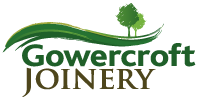Choosing the right timber is critical for both quality and sustainability. At Gowercroft Joinery, we are committed to using materials that meet high standards for durability and ethical sourcing and avoid woods that do not meet our standards. This blog explains why we avoid using certain types of timber, despite their appeal, and why we only source timber with FSC (Forest Stewardship Council) certification.
Comparison Table: Accoya, Red Grandis, Iroko, Sapele, and Idigbo
| Feature | Accoya | Red Grandis | Iroko | Sapele | Idigbo |
|---|---|---|---|---|---|
| Durability | Class 1 (Very Durable) | Class 3 (Moderately Durable) | Class 1 (Very Durable) | Class 3 (Moderately Durable) | Class 3 (Moderately Durable) |
| Dimensional Stability | Extremely Stable | Fairly Stable | Stable | Prone to Warping | Moderate Stability |
| Sustainability | Fast-Growing, 25-30 Years | Fast-Growing, 20 Years | Near Threatened Species | Overharvesting concerns | Vulnerable Species |
| Maintenance | Low Maintenance | Moderate Maintenance | Low Maintenance | Requires Regular Maintenance | Requires Regular Maintenance |
| Cost | £££ | ££ | £££ | ££ | £ |
Iroko: Durable, But Ethically Concerning
Durability: Iroko is highly durable, making it ideal for outdoor use. It is classified as Class 1 (Very Durable) and is resistant to decay and insects.
Dimensional Stability: Iroko is stable, with little movement in response to moisture changes. This makes it reliable for long-lasting structures.
Sustainability and Ethical Concerns: Despite its strength, Iroko has significant ethical and sustainability issues. As of July 2024, it is listed as Near Threatened (NT) on the IUCN Red List due to over-harvesting. Additionally, its extraction has led to environmental damage and social conflicts in regions like the Democratic Republic of Congo. At Gowercroft Joinery, we avoid Iroko to prevent contributing to the depletion of this species and the associated social issues. We also ensure that all our timber is FSC-certified, guaranteeing it comes from responsibly managed forests.
Sapele: Attractive, But Problematic
Durability: Sapele, known for its hardness, is classified as Class 3 (Moderately Durable). While it resists decay and insects, it doesn’t last as long as more durable timbers. It may need more maintenance, especially in harsh outdoor environments.
Dimensional Stability: Sapele has stability issues. It tends to warp during the drying process, leading to wasted material. The grain can lead to “tear-outs” when worked, resulting in wastage and the need for additional processing, which increases costs.
Sustainability: One bonus of Sapele is it is great at carbon sequestration. However, Sapele trees take 60 to 100 years to mature, and over-harvesting threatens their population. Whilst Sapele is not listed as Vulnerable on the IUCN Red List, there are severe overharvesting concerns. Its hardness can also blunt tools more quickly than other timbers. This not only increases the cost of processing but also makes it less sustainable, as the frequent replacement of tools or blades adds to the overall environmental footprint. Therefore, slow growth, combined with high wastage, makes Sapele a less sustainable option. We focus on using timbers that are both durable and sustainable, and Sapele doesn’t meet these standards.
Idigbo: Not Worth the Environmental Cost
Durability: Idigbo, like Sapele, is moderately durable. It offers some resistance to decay, but it isn’t as long-lasting as other sustainable options.
Dimensional Stability: Idigbo’s stability is moderate. It can be affected by moisture, which compromises its structural integrity over time.
Sustainability: Idigbo trees take 40 to 60 years to mature, and the species is Vulnerable on the IUCN Red List. Unsustainable logging practices further threaten its survival. Given these sustainability issues, we avoid using Idigbo. Our commitment to using only FSC-certified timber helps protect vulnerable species and promotes responsible forestry.
Our Commitment to Ethical and Sustainable Timber
At Gowercroft Joinery, sustainability and ethical sourcing are core to our business. While Iroko, Sapele, and Idigbo have certain benefits, the environmental and ethical costs are too high. Instead, we use timbers like Accoya and Red Grandis, which offer excellent performance and align with our values.
By choosing FSC-certified timber, we ensure our products are long-lasting and environmentally responsible, helping to preserve forests for future generations. This is our commitment to our customers and to the planet.
Choose sustainability for your next project with our Accoya timber windows. To find the perfect range for your project check out our high performance Frontier Range for new builds or our aesthetically sensitive Heritage Range for listed properties and conservation areas

